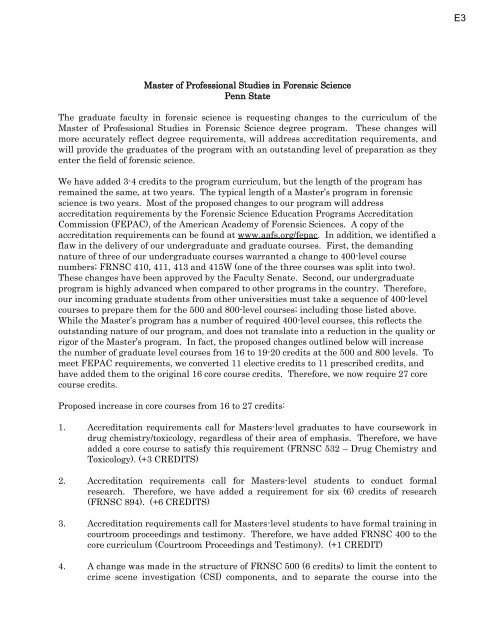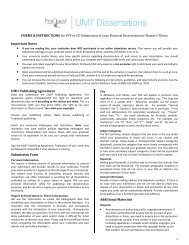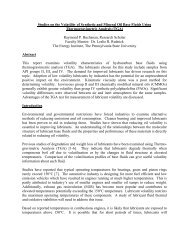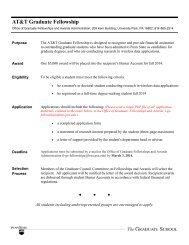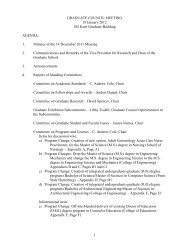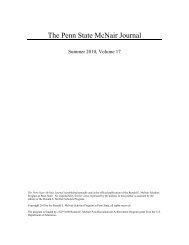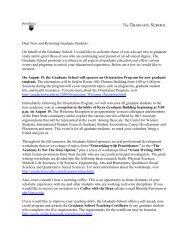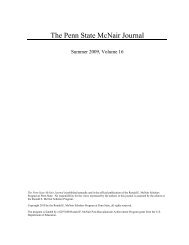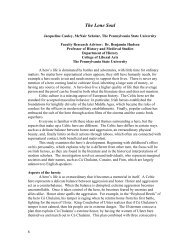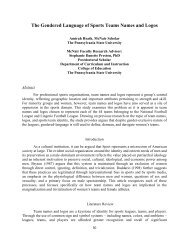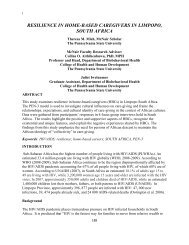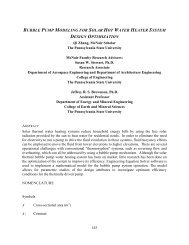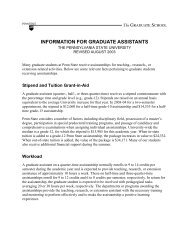1 GRADUATE COUNCIL MEETING 9 May 2012 102 Kern Graduate ...
1 GRADUATE COUNCIL MEETING 9 May 2012 102 Kern Graduate ...
1 GRADUATE COUNCIL MEETING 9 May 2012 102 Kern Graduate ...
You also want an ePaper? Increase the reach of your titles
YUMPU automatically turns print PDFs into web optimized ePapers that Google loves.
E3<br />
Master of Professional Studies in Forensic Science<br />
Penn State<br />
The graduate faculty in forensic science is requesting changes to the curriculum of the<br />
Master of Professional Studies in Forensic Science degree program. These changes will<br />
more accurately reflect degree requirements, will address accreditation requirements, and<br />
will provide the graduates of the program with an outstanding level of preparation as they<br />
enter the field of forensic science.<br />
We have added 3-4 credits to the program curriculum, but the length of the program has<br />
remained the same, at two years. The typical length of a Master’s program in forensic<br />
science is two years. Most of the proposed changes to our program will address<br />
accreditation requirements by the Forensic Science Education Programs Accreditation<br />
Commission (FEPAC), of the American Academy of Forensic Sciences. A copy of the<br />
accreditation requirements can be found at www.aafs.org/fepac. In addition, we identified a<br />
flaw in the delivery of our undergraduate and graduate courses. First, the demanding<br />
nature of three of our undergraduate courses warranted a change to 400-level course<br />
numbers; FRNSC 410, 411, 413 and 415W (one of the three courses was split into two).<br />
These changes have been approved by the Faculty Senate. Second, our undergraduate<br />
program is highly advanced when compared to other programs in the country. Therefore,<br />
our incoming graduate students from other universities must take a sequence of 400-level<br />
courses to prepare them for the 500 and 800-level courses; including those listed above.<br />
While the Master’s program has a number of required 400-level courses, this reflects the<br />
outstanding nature of our program, and does not translate into a reduction in the quality or<br />
rigor of the Master’s program. In fact, the proposed changes outlined below will increase<br />
the number of graduate level courses from 16 to 19-20 credits at the 500 and 800 levels. To<br />
meet FEPAC requirements, we converted 11 elective credits to 11 prescribed credits, and<br />
have added them to the original 16 core course credits. Therefore, we now require 27 core<br />
course credits.<br />
Proposed increase in core courses from 16 to 27 credits:<br />
1. Accreditation requirements call for Masters-level graduates to have coursework in<br />
drug chemistry/toxicology, regardless of their area of emphasis. Therefore, we have<br />
added a core course to satisfy this requirement (FRNSC 532 – Drug Chemistry and<br />
Toxicology). (+3 CREDITS)<br />
2. Accreditation requirements call for Masters-level students to conduct formal<br />
research. Therefore, we have added a requirement for six (6) credits of research<br />
(FRNSC 894). (+6 CREDITS)<br />
3. Accreditation requirements call for Masters-level students to have formal training in<br />
courtroom proceedings and testimony. Therefore, we have added FRNSC 400 to the<br />
core curriculum (Courtroom Proceedings and Testimony). (+1 CREDIT)<br />
4. A change was made in the structure of FRNSC 500 (6 credits) to limit the content to<br />
crime scene investigation (CSI) components, and to separate the course into the


